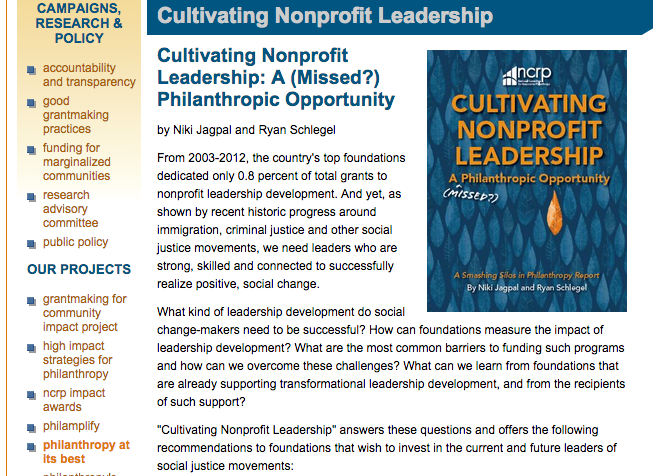
Cultivating Nonprofit Leadership Webinar: Key Take-Aways
March 25, 2015 // The Whitman Institute
Yesterday, NCRP hosted Cultivating Leadership in Movement Building, a webinar designed to accompany the recent release of their report, Cultivating Nonprofit Leadership: A (missed) Philanthropic Opportunity. Ryan Schlegel, who co-authored the report, moderated and the speakers were Jodie Tonita, Pia Infante, and Taj James. Each speaker discussed why cultivating leadership in the realm of social impact is so important — whether you are a funder, intermediary, or nonprofit. While they raised many interesting points, I want to highlight a few key take-aways that resonated with me:
- Jodie Tonita, Co-Founder and Executive Director of the Social Transformation Project reminded us of the significant role intermediary organizations play in the “human-infrastructure” of our movements, and how essential it is to provide leaders with platforms for collaboration to make better and more sustainable impact. STP specifically focuses on working with promising and influential non-profit leaders to build partnerships, collaboration, and personal development.
- Taj James, Founder and Executive Director of Movement Strategy Center, talked about the need for a paradigm shift that views leadership development within a frame of “interdependence.” Taj reflected that humans are naturally interdependent and this reality should be be uplifted as a core value if we are to transform philanthropy and leadership.
- Taj wants to encourage “a belief in people and a belief in their collective action to improve conditions,” which he says is essentially democracy. He believes a shift towards trust, towards believing in people’s capacity for change, is why leadership development is so important.
- Pia Infante is TWI’s Co-Executive Director along with John. She began by echoing a point first made by Jodie: “As Jodie said, growing and building trust is what moves the world.” Pia reflected on the development of soft skills like communication and relationship-building, making the point that what we call soft-skills are actually skills which are very hard to develop. Pia expressed: “Soft-skills in our leaders hold up our world,” and “we (TWI) want to make the case for interweaving soft and hard skills.”
- Pia also mentioned how feedback from our grantees is one way to know if leadership development actually works; finding ways to measure the effect of leadership development is a good way to encourage funding for it.
Other points made, which are significant:
- Having sophistication in soft-skills enables us to make more progress in realizing our aspirations for social change.
- Encouraging funders to incorporate soft skills into their own practices as it makes sense in their field is one way to transform philanthropic funding for leadership.
- Our framing of leadership helps us and limits us; it separates positional leadership vs. leading people; both of which are integral to movement building.
- We need to support whole human beings, not just better leaders… as they become better leaders they are becoming better people.
- Leadership development is one way to equip people with the skills they need to affect social change.
Lastly, I’d like to leave you with a few questions to think on that came out of this webinar:
- How do we know leadership development works?
- How do we support human development, also known as leadership development?
- What would it take to bring more resources to leadership development, particularly in the service of building stronger, more collaborative social and political movements?
Friends, I especially appreciate Pia’s insight about the value—and challenging nature—of so called “soft skills”. I assume she means such things as cultivating trustworthy relationships and sustaining one’s heart and courage in the face of long-haul struggles. We all must develop and draw upon such human capacities to serve the common good. Thanks for your affirmation of the importance of supporting “inner work” in service of our service in the world.
Thank you, Rick, for reading and for sharing. I do indeed mean cultivating trustworthy relationships and sustaining one’s heart and courage. I would include the capacity to listen deeply, invite and integrate feedback, and sophistication in being direct *and* kind in communications. TWI appreciates you and the Center’s long time commitment to cultivating “inner work” in the service of social change. Many thanks and warm regards to you and yours.